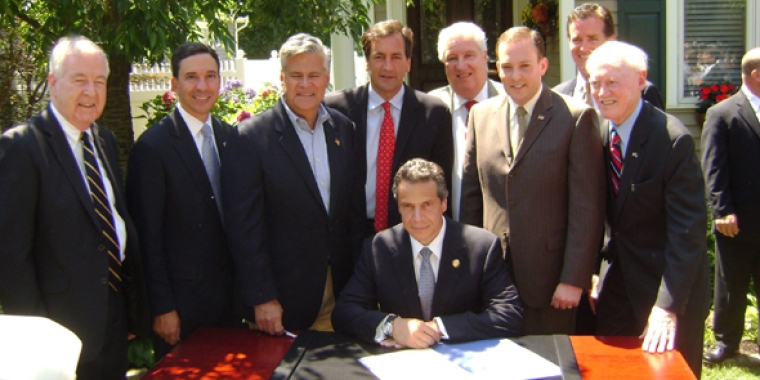Governor Signs Tax Cap Into Law

From Anton Community Newspapers
By Rich Forestano and Melissa Argueta
It was met with ire by school districts and local villages and commended by residents and businesses. But on June 30, with positives and negatives aside, the bill became law.
New York State Governor Andrew Cuomo visited Lynbrook last week to sign the 2 percent property tax cap into law. The tax cap was a major platform Governor Cuomo touted during his campaign to deliver property tax relief to homeowners and business owners across the state.
Cuomo signed the property tax cap on the front lawn of the all-American home of James and Janet Gannon. Like many taxpayers in Nassau County, the Gannons, parents of four children, have made sacrifices to afford the state’s skyrocketing property taxes.
Cuomo said that the property tax debate has been going on for decades, with a tax cap first proposed in New York in 1990. The state of Massachusetts passed a tax cap in 1980. “This is really a big deal today. This property tax cap is going to make a major difference for people all across the state. Now, Long Island knows the story of property taxes well. You have the highest property taxes literally in the country here. The old question used to be when you were buying a house was can you afford the mortgage? Now the question is can you afford the property taxes,” Cuomo said.
“Property taxes are a problem all across this state,” Governor Cuomo said. “It [property taxes] literally has been chasing people from their homes for years. I can’t tell you how many people have come up to me saying, ‘I have to sell the house because I just can’t afford to pay the property taxes.’”
According to Cuomo, now, the tax cap limits the increase in property taxes each year for school districts and local municipalities to just 2 percent, or the rate of inflation, whichever is lower. If a community chooses to increase taxes more than the tax cap allows, a 60 percent vote in a school budget vote or a 60 percent vote by a local legislative body can override it. A school district would be required to submit a tax levy proposition for approval by voters at the district’s annual meeting on the third Tuesday in May. A school district that does not levy an amount up to the cap in any one year would be allowed to carry over unused tax levy capacity into future years. However, this carryover levy capacity cannot be used to increase its tax levy by more than an additional 1.5 percent above the cap in any single year.
“It works, it’s simple, it’s a long time coming but today it is a reality,” Cuomo said.
The Gannons pay nearly $11,000 annually in property taxes, close to three times the median property tax bill in New York State, according to state officials. Mr. Gannon is a small business owner and Mrs. Gannon is a public school nurse at the Shore Road School.
The Gannons have lived in Lynbrook for 25 years and James said he doesn’t plan on leaving. Furthermore, the Gannons feel this cap will aid their struggle with property taxes.
“There is a struggle with it,” Gannon said. “You make cuts in what you have to do in order to afford it. The taxes have surpassed the mortgage I had on this house. The taxes were one of the things that kept growing.”
Gannon said he hopes this law will ease the problem so many families in New York State face. He stated he only hopes he doesn’t see the $11,000 figure again.
“Between raising children and trying to maintain a house, this is a big help,” Janet Gannon said. “I think [the governor] is thinking about the people and what their needs are.”
Mr. Gannon said a local government official reached out to him to hold this signing at his home, which he called a “no-brainer.”
“I really appreciate him coming here,” he said while gazing at his American Flag flying on his front lawn. “We were on board from the beginning.”
The property tax cap was sponsored by Senate Majority Leader Dean G. Skelos (R-Rockville Centre) and co-sponsored by Senator Jack M. Martins (R-Mineola).
“It’s entirely appropriate that the Governor comes to Nassau County to sign a tax cap,” Martins said. “It was a tremendous session and if there’s one theme that can come out of this session it’s that New York is back on track and we showed government is willing to work together in a bi-partisan fashion and there’s certainly hope for issues people feel are insurmountable. Hope is there.”
If the proposed tax levy were within the district’s tax levy limit, then a majority vote would be required for approval. If the proposed tax levy seeks to override the cap and exceeds the district’s tax levy cap, the threshold required for approval would be 60 percent of the vote.
Skelos thanked the Gannons for inviting lawmakers into their community and took time to listen to their neighbors’ concerns. “Throughout the state of New York and certainly here on Long Island, where we pay the highest taxes in the nation, people, many of you here, neighbors, friends, other communities, they are all saying ‘enough, enough with property taxes,’” he said.
Thanking Cuomo for his leadership and making the property tax cap a priority, Skelos maintained that the tax cap will not only help current taxpayers, but will as well for the next generation of Gannons who are probably wondering how they will pay their taxes in the future.
“That’s a priority for us. That’s a priority for the governor. That’s not a Republican or a Democrat priority. That’s a priority that we want to make your future a great future and that you can come to Lynbrook and grow your own family,” Skelos said.
Nassau County Executive Edward Mangano stated that he supported a tax cap during his campaign and supports it today. “It’s government working together to achieve results,” Mangano said. “This plan will put an end to sky high property tax increases and help get our state back on the right financial track.”
Assemblyman Edward Ra of the 21st District reacted to the signing of the bill and pointed out that together, all the leadership got something done that the governor had said was a major priority.
“It was a lot of hard work to get here but, you know, we’re happy to see the result come through,” he said.
Ra acknowledged that the tax cap will have an impact on school districts and many school districts are asking government officials to consider imposing mandate relief. “One of the biggest fights that needs to continue is the mandate relief end of it. We did a little bit of it and I think we need to keep working on that,” Ra said.
